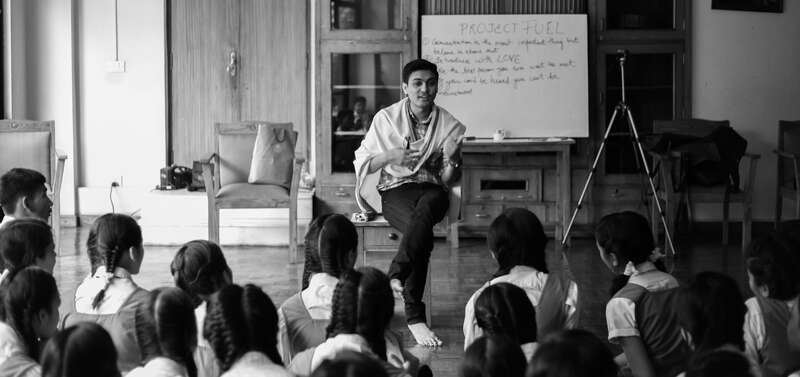If we would have to describe Deepak Ramola with one word, that would be storyteller. He is the founder and artistic director of Project FUEL, an organisation documenting, designing and passing human wisdom. We had a chance to sit down with him and talk about the theme of the HundrED Innovation Summit, “The Beautiful Risk of Innovation."
“Education innovators are by default connected to human dignity”
One key aspect when considering innovation in education is to think about how it can affirm human dignity and advance human rights. Deepak considers innovation in education to be philanthropic in nature, arguing that innovators are, by default, connected to human dignity. “Because they are anchored to the intention of trying to be philanthropic in their endeavour of doing good, making society progress, making minds and learning processes easier for the collective growth”, Deepak argues.

But when discussing innovation in education, it is equally important to consider the ethical implications of implementing new ideas and projects. In this sense, Deepak proposes that every innovator asks themselves key questions: “If I want to get no money for my solution will it still be useful to pass it on? And if it would be, how does it serve my participant, or learner? If nobody was watching, would I still be doing or creating this feature?”
Is the education community ready to unlearn?
Innovation also involves a wide variety of risks, not only for the risk-taker, or the innovator, but for the whole education community. In this context, Deepak suggests that the biggest risk that the community should be willing to take is the requirement of unlearning. As he explains, even when something does not seem to work, it still takes a lot of courage and determination. We need to leave our comfort zone and unlearn what was initially said to create something above it.
“Power often resides within a school but how do we expand the understanding of what a classroom is, what a learning environment is for the children?”, he asks.
With this question, Deepak introduces another risk for the education community which is decentralizing power. He argues that within the school framework, there should not be any fear of involving more the families, the community, and the child itself, to transform the system.
Three life lessons for the education community
“We have to honor the wisdom of children too. We have treated them for well long as empty buckets that need to be filled with content. But we have to acknowledge what they know, and how their knowing can inform what we can then teach them.”
This need for transforming the traditional education system has been exacerbated by the pandemic. In this sense, Deepak shares three life lessons that could help the next generation in building the bridges towards the future:
- On a systemic level, he suggests bringing more human stories and moving away from the statistical quantification of students. "Instead of just stating that 3000 students benefited from something, give that number a characteristic, humanise your data by including more names, attributes to transform this quantification to a more respectful and personalised understanding."
- On a classroom level, Deepak advocates educators as role models, not just knowledge dispensers. As he explains, with technology children can have different options for inspiration, and learning but what makes technology truly meaningful is the teacher who is teaching.
- As for the children, Deepak encourages students to ask themselves a question: why and how am I using technology? Do I use the internet to create an identity or navigate through the one I already have?"?
From Deepak’s talk in HundrED Innovation Summit 2022, the audience can expect “new life lessons from children, stories rooted in human dignity and human wisdom and lastly, a moment for self-reflection of identifying how to turn themselves into a learner, to not just keep serving other learners." As an opening, Deepak sends just one more question to the audience:
If you could teach a subject that is not taught in school today, what would you teach and why?
If you have an answer or a reflection to share, send it across at hello@deepakramola.com